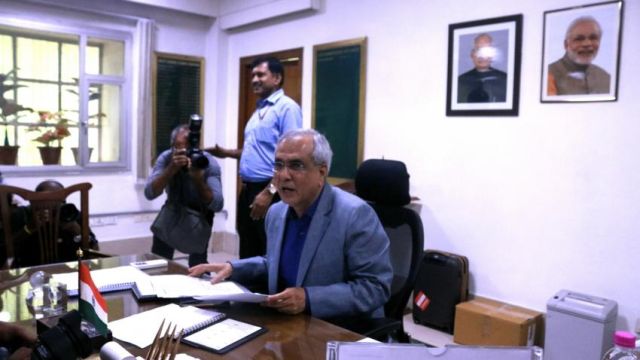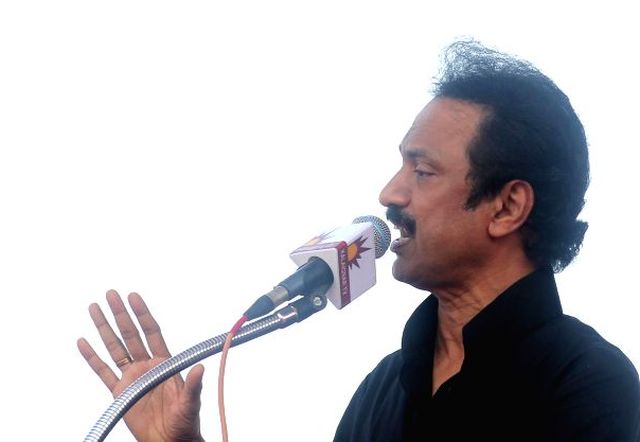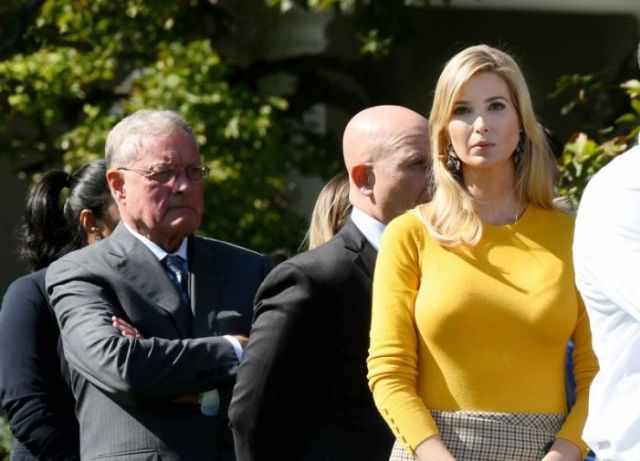
by Editor | May 25, 2021 | Economy, News, Politics

Rajiv Kumar
New Delhi : Unfazed by the official data on Friday showing that the Indian economy will grow at a slower pace compared to the last fiscal, NITI Aayog Vice Chairman Rajiv Kumar has said the GDP growth will become more robust in 2018-19.
Kumar’s remarks came after Chief Statistician T.C.A. Anant announced that Indian economy was expected to grow at a slower 6.5 per cent in 2017-18 compared to the 7.1 per cent in 2016-17.
Reacting on the growth estimates, Kumar said the GDP growth in the second half of 2017-18 had risen to seven per cent bringing the annual growth rate to 6.5 per cent.
According to a statement issued by the NITI Aayog, Kumar pointed out that economic activity had been picking up over the last three quarters and can be expected to strengthen in the coming period “with the manufacturing Purchasing Managers’ Index (PMI) now reading at a five-year high of 54 per cent, and FMCG demand picking up briskly”.
“Hence the GDP growth will become more robust in 2018-19.”
He added that the estimates assume significance in the wake of the fact that the higher second half growth had come despite a weaning of public sector expenditures which had peaked in 2016-17 on account of the implementation of the Seventh Pay Commission recommendations.
—IANS

by Editor | May 25, 2021 | Investing
 New Delhi : The projections for investment in the country’s infrastructure in the last five years has been revised upwards by the government to Rs 38,22,822 crore, Parliament was informed on Friday.
New Delhi : The projections for investment in the country’s infrastructure in the last five years has been revised upwards by the government to Rs 38,22,822 crore, Parliament was informed on Friday.
Finance Minister Arun Jaitley told the Lok Sabha during Question Hour that the NITI Aayog had revised the projection for investment in infrastructure in 2012-17 to Rs 38,22,822 crore, which is 1.6 times the investment of Rs 23,77,746 crore achieved during 2007-12 at current prices.
“The total allocation for infrastructure sector in Budget 2017-18 stands at Rs 3,96,135 crore. The government recently announced a major infrastructure push with launch of Bharatmala programme,” he said.
Jaitley noted that there was no central or single registry of infrastructure projects along with their funding in the country.
Infrastructure projects in India are implemented in both public-private partnership (PPP) and private modes, while the public sector projects were implemented by the Centre, state governments as well as local bodies.
The Finance Minister also said the government had taken a number of steps to mobilise funds from various sources for development of infrastructure, including launching of innovative mechanisms like infrastructure debt funds, Real Estate Investment Trusts (REITs), National Investment and Infrastructure Fund (NIIF), issuing a framework for municipal bonds and allowing complete pass-through of income tax to securitisation trusts.
—IANS

by Editor | May 25, 2021 | News, Politics

DMK Working President M.K. Stalin
Chennai : DMK Working President M.K. Stalin on Monday said Prime Minister Narendra Modi should rein in members of the Niti Aayog from voicing views that affect the cooperative federal structure of governance.
In a statement issued here, Stalin urged Modi to stop the members and Vice Chairman from voicing views that interfere with the cooperative federal structure of governance and social justice.
Stalin also said if Niti Aayog is to be used to centralise power and take away the power of the states then there is no meaning in Chief Ministers being members of its Governing Council.
The DMK leader was reacting to Niti Aayog Member Ramesh Chand’s views that agriculture should be transferred to the central list from the state list.
Chand was reported to have said that time has come to move agriculture from the state list to the concurrent or central list.
Stalin said when the Modi government dismantled the 65-year-old Planning Commission the slogan was cooperative federalism.
He said the central government has washed its hands of when it came to farmers debt and their suicide, and now wants the agriculture sector to be moved to the central list and has also formed a task force to recommend sectoral reforms.
Stalin said the views of Niti Aayog that there is no need for reservation in private sector employment is also an interference in state’s powers.
—IANS

by Editor | May 25, 2021 | Business Summit, Entrepreneurship, Events, Investing, News, Politics, Social Round-up, Women Entrepreneur

Ivanka Trump
New Delhi : Indian and US officials met here on Tuesday in the run up to the November 28-30 Global Entrepreneurship Summit in Hyderabad that will be inaugurated by Prime Minister Narendra Modi and Ivanka Trump, President Donald Trump’s daughter and advisor.
According to an official statement, Indian and US officials met at NITI Aayog office here to plan the 2017 Global Entrepreneurship Summit which is themed around “Women First, Prosperity for All”.
The summit is expected to be attended by over 1,600 delegates, including entrepreneurs and investors, CEOs of major knowledge-based industries, representing the full measure of entrepreneurial talent from diverse backgrounds across the world.
The participants from 160 countries will represent a diverse range of geographies, industries, business size and scalability.
“Investors and representatives from organizations that support entrepreneurs will be hand-picked to catalyze investment, networking and mentoring. There will be special emphasis on empowering young and women entrepreneurs and the role they play in making communities more prosperous and secure through enterprise,” the statement said.
NITI Aayog is taking the lead in organising the summit.
Amitabh Kant, CEO NITI Aayog, said it was a unique opportunity for Indian startups and innovators to interact and network with the finest entrepreneurs of the world.
“We need to harness technology to solve some of the most pressing problems in healthcare delivery, education, energy, safe drinking water and agriculture, among others for the benefit of communities at large. Innovation and entrepreneurship will play a decisive role towards this end. I am sure this will be a unique opportunity for entrepreneurs to interact with the best,” Kant said.
Jennifer Arangio, Senior Director at the US National Security Council, was quoted in the statement as saying the US was proud to partner with India for this year’s GES.
“Uniting under the theme Women First, Prosperity for All, the summit will highlight the Trump administration’s commitment to the principle that when women are economically empowered, communities and countries thrive.”
Arangio said hosting the summit in India was a signature of the “broad and enduring partnership between our two countries”.
NITI Aayog and the US Embassy here are planning a series of ‘Road to GES’ events in collaboration with different agencies to attract the attention of different stakeholders.
As part of the summit, there will be a virtual exhibition of India’s innovative prowess in collaboration with the Department of Industrial Policy and Promotion. It is also proposed to showcase India’s heritage, social entrepreneurship and craftsmanship in collaboration with the Ministry of Rural Development and Ministry of Culture.
—IANS

by Editor | May 25, 2021 | Business, Corporate, Corporate Governance, Economy, Employment, Large Enterprise, News, Politics
 By Arul Louis,
By Arul Louis,
United Nations : The threat to jobs from automation was overstated and “robophobia” should not deter countries from adopting a manufacturing and exports based strategy for rapid economic growth, according former Niti Aayog vice chairperson, Arvind Panagariya.
“One should not freeze in to inaction on account of ‘robophobia’ from following the path of manufacturing and exports that had led some of the Asian countries out of poverty,” Panagariya said on Monday while addressing the UN General Assembly’s committee on economic and financial issues.
“Countries easily have a 15-year window to pursue manufacturing and exports based strategy.”
The technologies have to be invented or developed and then they have to commercialised before robots can replace workers, he said.
Panagariya, who left the Niti Aayog late August and was now back at the Columbia University where he is the professor of economics holding the Jagdish N. Bhagwati chair of Indian Political Economy.
Fresh from a 32-month stint helping develop economic policies and direction for India, he was invited by the General Assembly committee to deliver the keynote address on “Road to Rapid Economic Transformation” at its inaugural meeting of the current session.
“Rapid economic growth held the key to elimination of poverty by both raising incomes and increasing the resources available to governments for investing in social programmes.
“Today there is scepticism about whether countries can repeat the performances of countries like South Korea and Taiwan by following their models of growth because of fears of automation and growing protectionism in the industrialised countries.
“We overstate because we can see what jobs automation will destroy (but) we cannot see what jobs automation will actually create. I draw on the history… No automation of the past has actually cut jobs. It has made us only busier and busier,” the former vice chairperson added.
While there were adjustments to be made in the short term, medium to long-run automation made the “labour market more intense,” he said.
There were some areas like making clothes or some technology manufacturing where robots cannot do the work of human beings and these were in labour-intensive sectors that have an important role in the early phase of high growth, Panagariya said.
As for fears of protectionism, he said that what matters to most countries is whether they can “capture a slightly larger piece of the gigantic world exports pie” than the changes to its size.
“The global market in merchandise and services exports is about $22 trillion and whether it expands to $25 trillion or shrinks to $20 trillion in the next five to seven years matters less compared to growing their share of the market by countries.”
For example, it was more important for India has to work on growing its share of the global market from the current 1.7 per cent to 5 to 7 per cent, he added.
In pursuing the UN goals of sustainable development, according to Panagariya, income redistribution alone would not go far in alleviating poverty without economic growth.
Only five countries — Japan, South Korea, Taiwan, Singapore. China — have grown at rates of 8 to 10 per cent over two decades and were able to rapidly transform themselves from traditional to modern societies practically eliminating poverty, he said.
“They were able to achieve in two or three decades what had taken the western industrialised nations a century.”
India seems to be the sixth country to be on that kind of a growth path, having grown at an average rate of 7.8 per cent over the last 14 to 15 years.
Although economists tend to underplay the role of leadership, it is the key factor in helping countries achieve high growth, he added.
(Arul Louis can be reached at arul.l@ians.in)
—IANS





